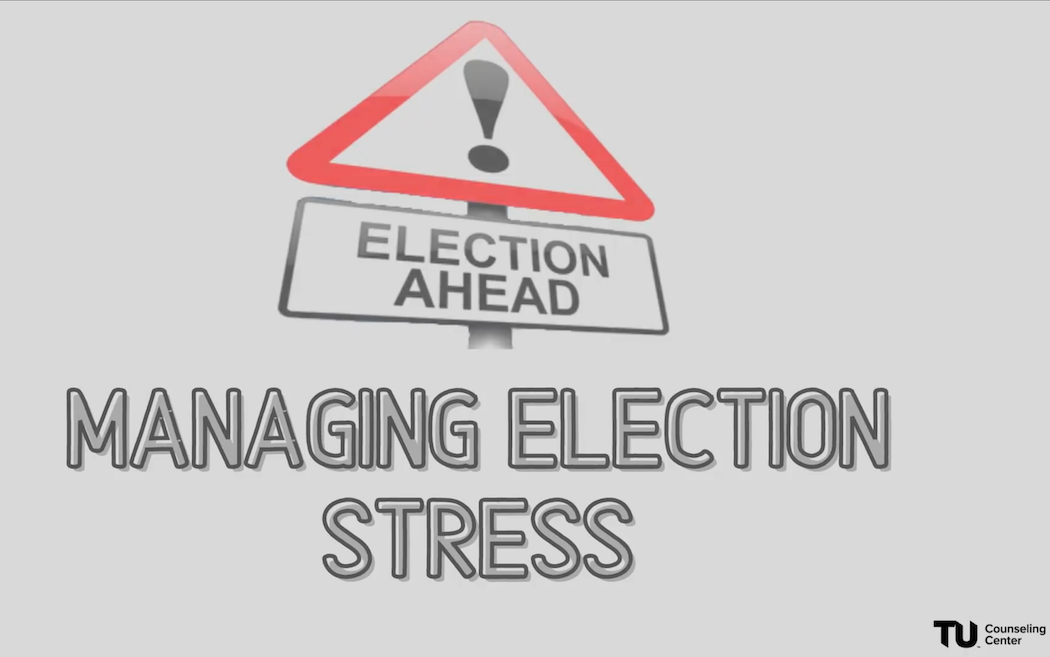How to take care of your mental health during the heated election season
Two staff psychologists start Facebook Live series on election stress
By Matt Palmer on October 26, 2020

With a week to go until Election Day, political passions are running high in the U.S. For some, the related tension and anxiety can be elevated and the results triggering.
Towson University, which is among nine institutions in the U.S. with at least 85% of students registered to vote, has a particularly helpful resource inside the Counseling Center.
Staff psychologists G Wei Ng, diversity coordinator, and Oluwatofunmi Oni, digital mental health coordinator, have collaborated on a Facebook Live series called, “Managing Election Stress,” which debuted Oct. 7. They took some time to answer questions about the series and shared helpful tips on thriving during the election season.
How did this video series come about?
Staff at the Counseling Center recognized that this election season is negatively impacting the mental health of many individuals, ourselves included. We started to discuss our experiences and drew from our knowledge about empirically supported strategies to manage anxiety and stress. We realized that this is very relevant to our experiences with the election and thought it would be helpful to create an interactive medium where we can bring our own experiences and share with the campus community about how we can better take care of our well-being during this stressful time.
What has been the most gratifying thing about it so far?
We enjoyed the opportunity to infuse our personality and style into our work while providing useful information through a mental health lens. But most of all, this is our way of coping with our own election stress—channeling our anxiety into something that we have control over and enjoy doing.
How often do you see students trying to deal emotionally with the results of elections?
The outcome of the election has significant implications on the lives of many students. Therefore, we often see students struggling with managing their real-life issues and the election being an additional factor impacting that stress. After all, we are in the midst of the election season while managing a very politicized global pandemic, racial injustices and remote learning. All of these issues are at the forefront of the political debate. Understandably, it may elicit a heightened emotional response for many people.
“ The acceptance of current reality does not define the actions that you can take moving forward. ”
What is your biggest message for anyone who struggles with election results?
The reality of a democratic process is that the outcome will not always be to one’s benefit. The sense of loss or dread is a very normal response. We believe the amazing thing about the democratic process is that change is inevitable, whether now or later. The acceptance of current reality does not define the actions that you can take moving forward.
We also think it is important that while everyone is entitled to their own political view and that freedom of speech is protected under the Constitution, sometimes the impact of other people’s words or actions can be hurtful and even harmful. As we have seen in recent events, we have the power to tear each other down or build each other up. It is important to remember that we don’t have to mirror the chaos and destructiveness around us; rather, we can choose to be intentional with our words and how we manage our emotions.
What advice do you have for people who get caught up in the election news cycle, especially on Election Day and prior to results?
Watch our series! Overexposure to information can increase anxiety and stress as well as activate our fear responses. This can negatively affect our mental health if not addressed. Set boundaries on information consumption and your news diet. Additionally, we recommend engaging in mindfulness by asking yourself how you feel before and after taking in this information. Use this information to decide how much exposure is enough to not cause harm to your mental health. This threshold is different for everyone. We offer additional tips and tricks in our video series.
What are positive ways a person can channel their passion into a positive impact on the community?
Decide what election issues are important to you, and use that to motivate you to take action. Whether your candidate wins or loses, find ways to meaningfully engage with advocacy on issues you care deeply about. Focus on areas that are within your sphere of influence and channel your energy into a few things that you can do to affect change.
If someone is looking for assistance, how can they receive help?
The Counseling Center is doing a month-long social media campaign that focuses on managing election stress. People are encouraged to follow our social media platforms (Facebook, Instagram, Twitter) to receive weekly updates on tips and coping strategies. Students can also reach out to the Counseling Center for a same-day virtual? appointment if they need a space to work through stress and anxiety. There will be post-election processing spaces available for students who wish to engage in dialogue and reflection around issues related to the election or to find support and decompress. More information will be available on the Counseling Center website and social media accounts.
This story is one of several related to President Kim Schatzel’s priorities for Towson
University: TU Matters to Maryland.
BTU-Partnerships at Work for Greater Baltimore and Diverse and Inclusive Campus.